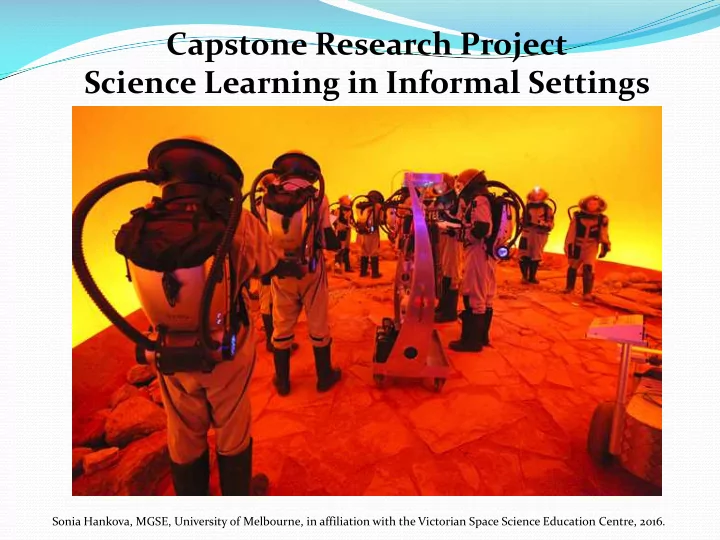

Capstone Research Project Science Learning in Informal Settings Sonia Hankova, MGSE, University of Melbourne, in affiliation with the Victorian Space Science Education Centre, 2016.
Questions/Questioning • Play a mayor role in knowledge construction and as an enabler of critical and creative thinking, inherent to science and the innovation process (Landau, 2007). • Lead us to wonder, build memory and imagination, focus attention, create emotional involvement, hook the learning and present opportunities to effectively examine the nature of both teaching and learning (Fusco, 2012). • Invoke engagement, drive learners to clarify their thinking and deepen their understanding (Rothstein & Santana, 2011) • Can be used to introduce new ideas, elicit existing knowledge, and encourage a powerful dialogue (Gregson, 2012). • Allow learners to make new connections to concepts and ideas (Peery et al., 2013) • Encourage learners to reflect on their ideas and to compare their perceptions with those of others (Fusco, 2012). • Build the confidence of students’ own questioning as they model their teachers (Pagliaro, 2011).
Research question: To what extent are higher order thinking questions posed by VSSEC educator during the Mission to Mars program to support and guide student learning? 1. To what extent does questioning during the program align with Bloom’s taxonomy? Do the questions asked by the educator target higher orders thinking? 2. What types of questions are posed by the educator? To what extent does questioning change as students’ progress through the program? 3. What types of questions stems are used by the educator? 4. To what extend did the students respond to questions posed? What types of questions does the program elicit in its participants? Does the instructor allow sufficient think/wait time? Through this research I hoped to gain a better understanding of the importance of questioning in the science classroom and anticipate that my research be of benefit to VSSEC as an evaluation tool of the quality of questioning techniques utilised during the Mission to Mars program.
Data collection tools INSTRUCTOR/PARTICIPANT! (C)!Literal!(closed)!! Ask!for!a!specific!answer,!require!memorisation!and!recitation;!have!only!one!right!answer! (O)!Inferential!(open)! Anticipate!responses!not!directly!stated!of!specified! ! (M)!Metacognitive! Encourage!students!to!reflect!on!their!thinking!and!learning! ! ! S"—"Student"response" SITUATION" EVENT" CHIOCE" PERSON" REASON" MEANS" +"—"Student"collective"Y/N" Time/Place" A"—"Educator"answer"" What?" Which?" Who?" Why?" How?" Where?"When?" *"Elaboration"cue" ! ! ! ! ! ! PRESENT:"is,"does?" " KNOWING/REMEMBERING" Recall!what!you!have!seen!or! heard?! ! ! ! ! ! ! PAST:"has,"did,"was?" " UNDERSTANDING" Explain!or!show!you! understand/comprehend?! ! ! ! ! ! ! POSSIBLITY:"can?" " APPLYING" Show!connections!! ! ! ! ! ! ! POBABILITY:"would?" " ANALYSING" Break!down!the!information!in! a!meaningful!way! ! ! ! ! ! ! PREDICTION:"will?" " EVALUATING" Justify!and!qualify!your! thinking/decision!with! evidence!and!reasoning! ! ! ! ! ! ! IMMAGINATION:"might?" " SYNTHESISING" Create!new!products,!ideas!or! a!new!way!of!looking!at!things! !
Results • To what extent does questioning during the program align with the different levels of Bloom’s taxonomy? • Do the questions asked by the educator target higher orders thinking? Bloom's&Taxonomy&of&ques9oning&& Misson&to&Mars&Program&& Synthesis& 1.97%& Higher&order& ques4ons& Lower&order& 30.50%& Evalua9on& 7.39%& ques4ons& Analysis& 21.18%& 69.50%& Applica9on& 5.91%& Undersatnding& 35.96%& Knowdlege& 27.59%&
Results • What types of questions are posed by the educator? • To what extent does questioning change as students’ progress through the program? Quesions'types'posed'by'educator' Ques7ons'posed'by'educator'during'different'stages' Question types posed by educator Mission'to'Mars' Mission'to'Mars' Mission to Mars 54.19%' 63.55%' 40.89%' 29.56%' 6.90%' 4.93%' Literal/closed' Inferen9al/open' Metacogni9ve' Group'1' Group'2' Prac'
Results • What types of questions are posed by the educator? • To what extent does questioning change as students’ progress through the program?
Results • What types of questions stems are used by the educator? Ques=on'stems'posed'by'educator' Mission'to'Mars' 72.91%' 9.85%' 5.91%' 4.93%' 4.43%' 1.97%' What' Where/when' Which' Who' Why' How'
Results • To what extend did the students respond to questions posed? • What types of questions does the program elicit in its participants? • Does the instructor allow sufficient wait time? Answered(own(ques,ons( Student(answers( Unanswered( 15.27%' 34.98%' 49.75%'
Recommendations The research concludes in recommendation for improvement by: • Suggesting the implementation of a procedure known as the ‘questioning cycle’, as outlined by Fusco (2012), in which the teacher plans questions, asks questions, allows wait time, listens to students responses, assesses student responses, follows up on those responses with another question, and re-plans based on students subsequent responses. • Utilising Chuck Wiederhold’s Question Matrix to sharpen questioning strategies of VSSEC educators, to broaden the range of question stems used and to target areas of more cognitive complexity to ensure the inquiry nature of the program remains supported.
References Fusco, E. (2012). Effective questioning strategies in the classroom: A step-by-step approach to engaged thinking and learning, K-8 . New York: Teachers College Press. Gregson, R. (2012). Connecting with Science Education . Oxford, England: University Press. Landau, E. (2007). Education towards the future: Asking questions. In A. Tan (Ed.), Creativity: A handbook for teachers (pp. 187-192). Singapore: World Scientific. Pagliaro, M. M. (2011). Exemplary classroom questioning: practices to promote thinking and learning . Oxford, England: R&L Education. Peery, A., Patrick, P., & Moore, D. (2013). Ask don't tell: Powerful questioning in the classroom . Englewood, CO: Lead + Learn Press. Rothstein, D., & Santana, L. (2011). Make just one change: Teach students to ask their own questions . Cambridge, MA: Harvard Education Press.
Recommend
More recommend